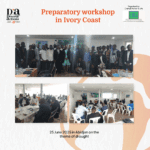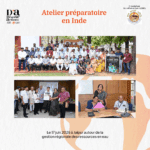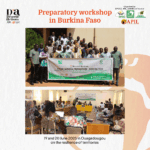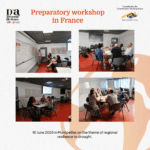News of 03/09/2025
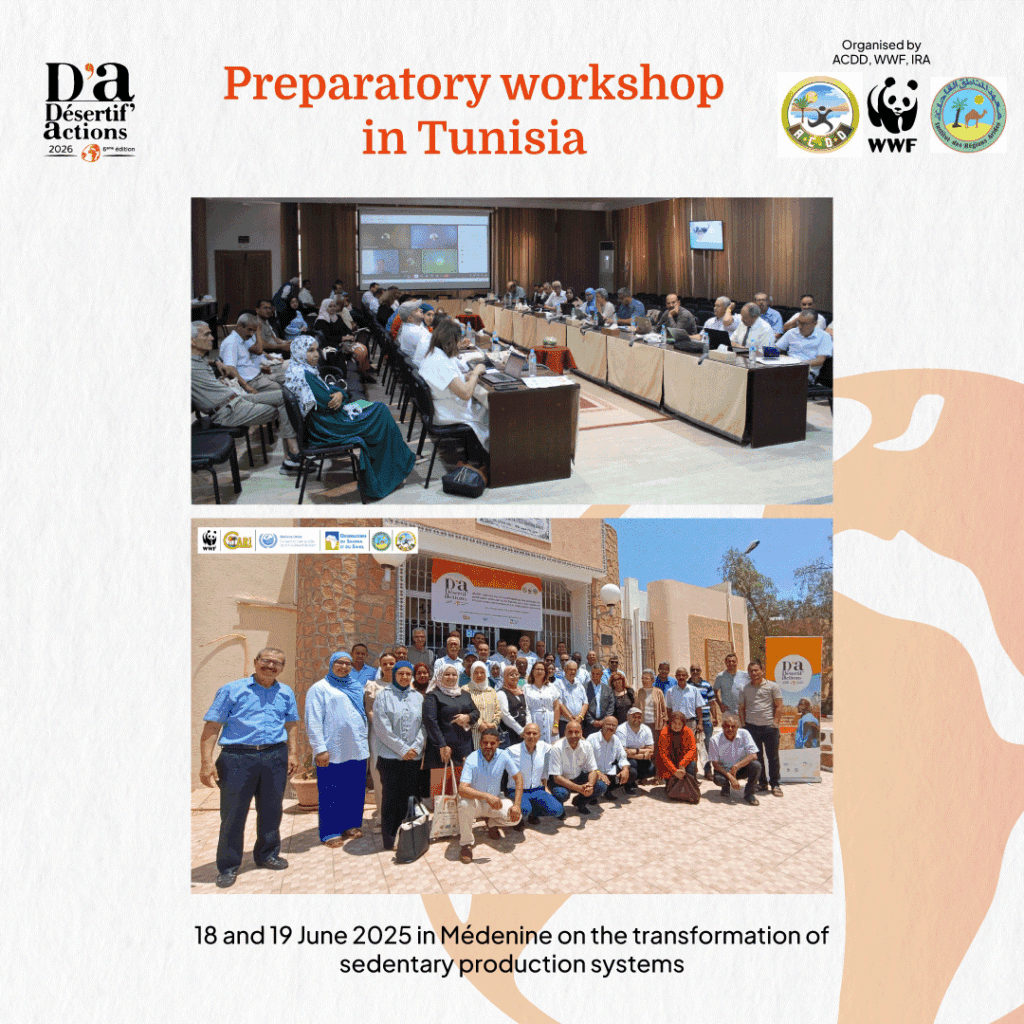
The ACDD (Association Citoyenneté et Développement Durable), WWF North Africa and the IRA (Institut des Régions Arides) organised a workshop on 18 and 19 June in collaboration with a number of partners, including the MEDD, the OSS, regional administrations and associations in southern Tunisia.
The aim of this event was to bring together national players to identify the levers for transforming sedentary production systems in Tunisia to make them more resilient to drought and land degradation.
A workshop to facilitate discussion and group work
Over the course of two days, some fifty participants discussed and pooled their collective thoughts on the theme of “Transforming sedentary production systems in Tunisia to improve resilience to drought and land degradation”. The workshop provided an opportunity to capitalise on national experiences of resilience to drought and to learn about the work and dynamics of the various players in the field.
The participants were divided into two groups to work in sub-workshops. This work was spread over the afternoon of the first day and most of the morning of the second day of the workshop.
Recommendations for action in arid zones
The first working group focused on technical and technological adaptations for diversified and resilient agriculture in Tunisia’s arid regions.
The participants identified recommendations based on eight strategic areas. Here are a few examples:
- Improving farming techniques in the oases: Implementing a three-storey oasis model for crop diversification, supported by research. Promote agro-ecological practices. Introduce appropriate mechanisation (semi-mechanical pollination, drones, aircraft).
- Improving cultivation techniques in rain-fed agriculture: Controlling the introduction of species/varieties; giving priority to labelled local varieties. Diversify dry crops (almond, pistachio, etc.). Encourage local multiplication of seedlings.
- Improving cultivation techniques in irrigated agriculture: Assessing the resilience of introduced species before dissemination. Strengthen local genetic diversity. Generalise localised irrigation techniques (e.g. Chehtech with treated waste water).
- Plant genetic resources: Identifying, conserving and developing the local species best adapted to water and salt stress. Carry out varietal selection programmes adapted to extreme conditions. Encourage the labelling of local varieties.
- Animal genetic resources: Conserve and promote local animal species, with rigorous monitoring of introductions. Strengthen research and development capacities for local breeds adapted to arid zones.
- Water management: Modernise irrigation systems using water-saving technologies (smart irrigation, multi-use agriculture/pisciculture). Monitor the flows and quantities of water used, particularly for irrigation, and adjust to actual needs. Define water requirements by crop for efficient irrigation planning.
- Sustainable soil management: Enriching the soil through the use of biochar, compost from oasis waste and rhizobium. Improve water retention in the soil through practices such as mulshing.
- Local knowledge and food systems: Inventory, capitalise on and pass on traditional knowledge, particularly between generations. Promote ancestral, integrated and resilient food systems.
- Technological innovation: Producing animal feed from agricultural by-products (circular recycling). Updating oasis atlases and mapping desertification using remote sensing (GIS).
- Disseminate best practice: Promote existing best practice. Identify new innovative practices based on feedback from the field. Enhance drought monitoring in marine areas using space technologies.
The second group worked on the theme of agroecology and the restoration of degraded ecosystems. The recommendations were organised along three lines: strategic, operational and financial. Here are a few examples:
- Strategic axes: Strengthen Tunisia’s drought resilience policy by integrating strategies for implementing the conventions resulting from the Rio-92 process and the SDGs into sectoral policies and national development plans. Roll out the national strategies for adaptation to climate change and resilience to drought at regional level, adopting an approach that takes account of specific territorial features and the updated agricultural map, and mobilising appropriate resources and skills.
- Operational areas: Draw up development action plans that are specific to and complementary with the various multilateral agreements ratified by Tunisia. Draw up territorial drought action plans. Strengthen capacities at territorial level for the elaboration and implementation of territorial drought action plans. Integrate the sea as an ecosystem that suffers the effects of drought on marine fauna and flora and the livelihood of island populations.
- Financial aspects: Allocate the financial resources needed to draw up and implement local drought action plans. Mobilise the necessary resources and partnerships to address this national issue. Improve the resilience of farmers and vulnerable communities to drought by mobilising the necessary resources to facilitate access to and the application of new technologies.
Read all the recommendations in the full workshop report (in French).
Southern Tunisian ecosystems sensitive to the effects of climate change
The work of the sub-workshops provided an opportunity to formulate recommendations for decision-makers and to contribute to the advocacy of Tunisian civil society within the framework of Désertif’Actions2026.
All the discussions highlighted the strong anthropic pressure over the last few decades on the ecosystems of southern Tunisia, making them more sensitive to the effects of climate change and desertification.
